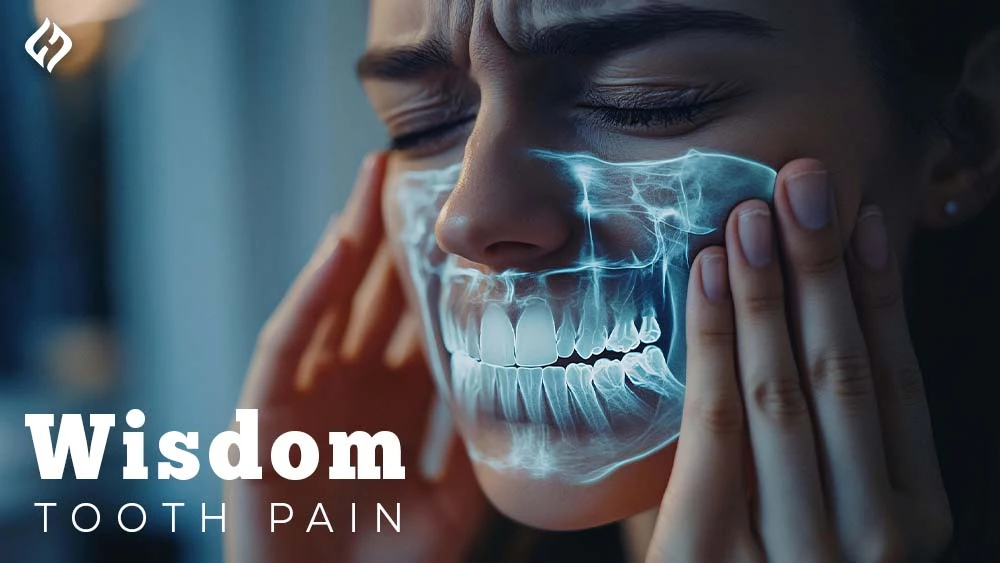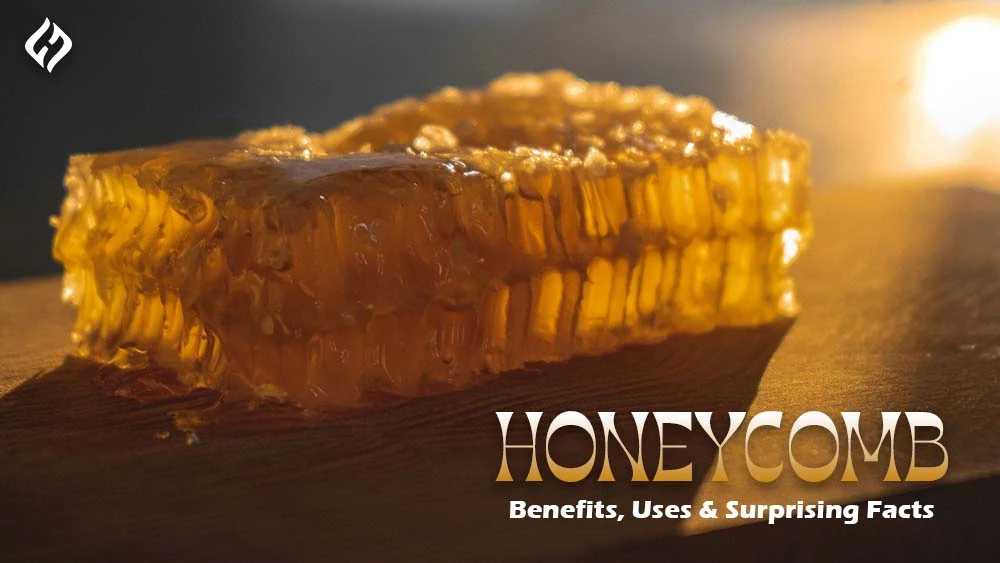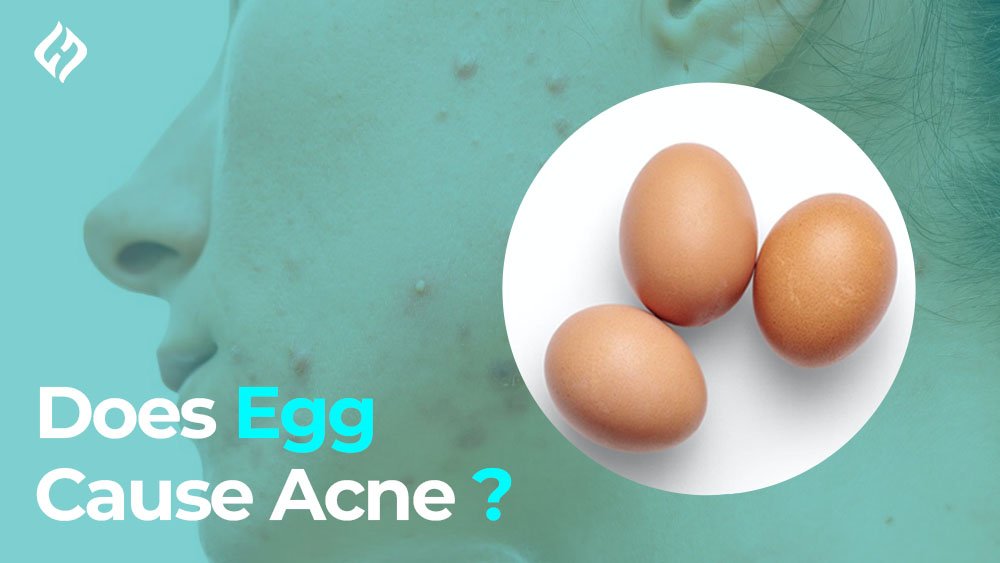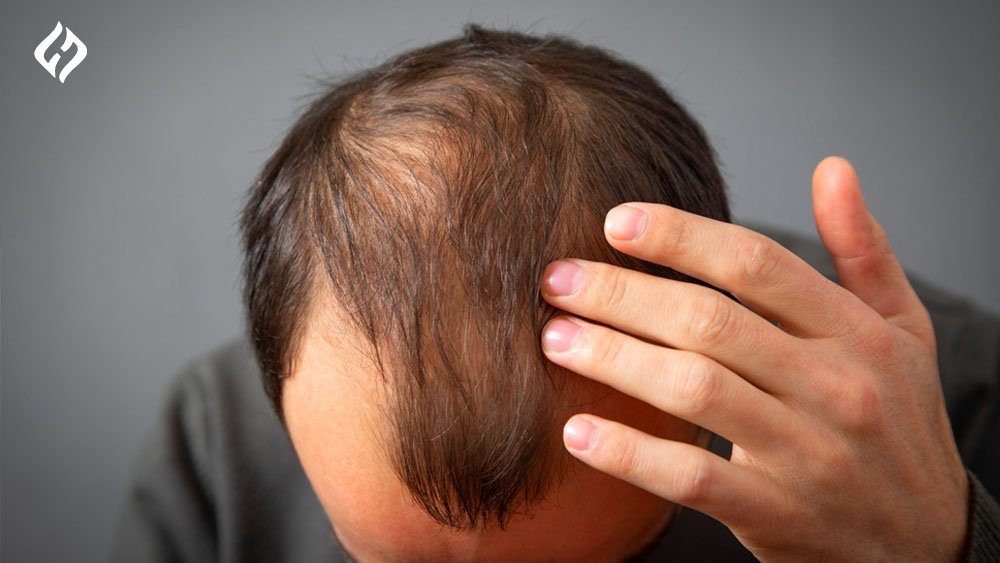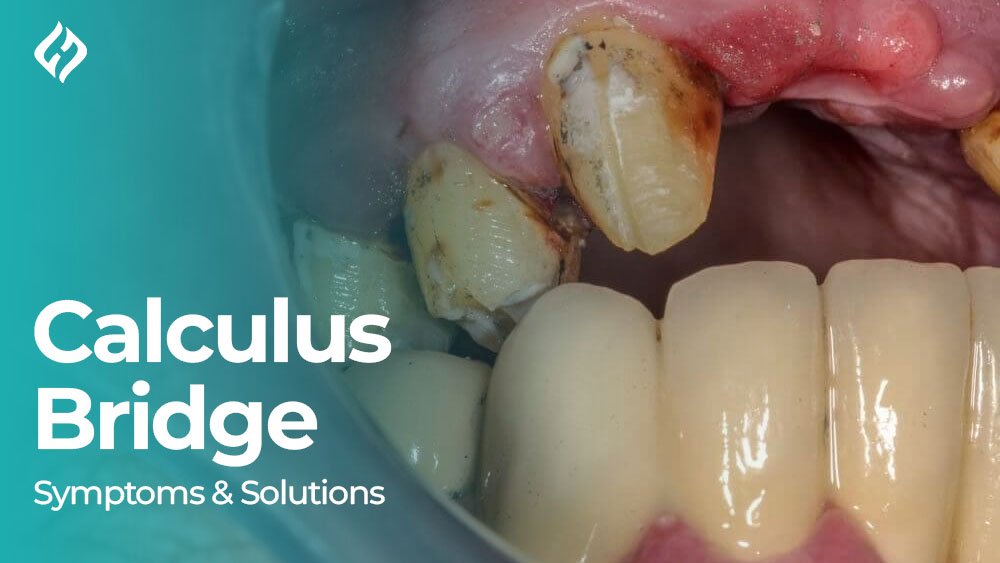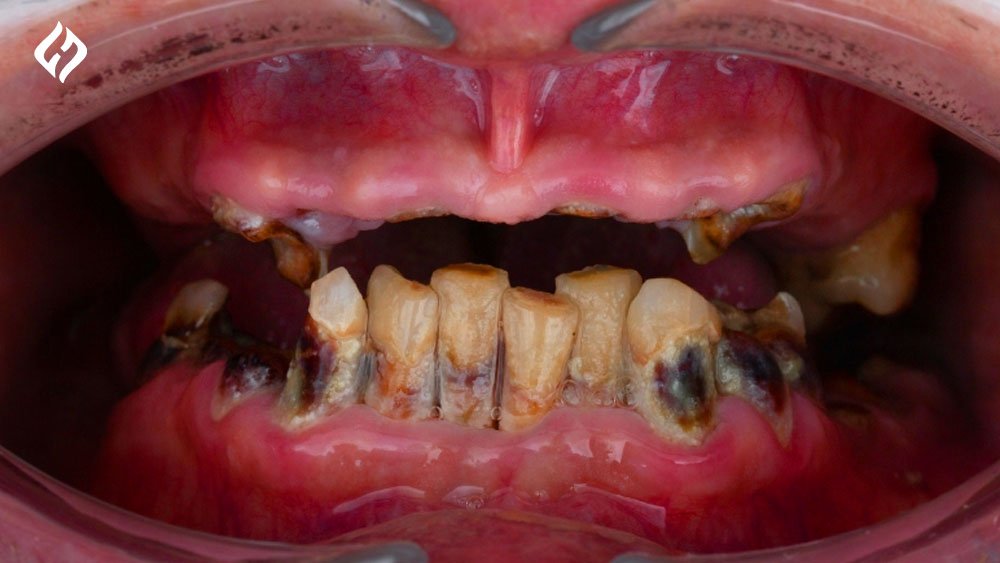Understanding Wisdom Tooth Pain
Wisdom tooth pain occurs when the third set of molar teeth grows up and breaks your gums. Wisdom teeth cause a lot of pain in your mouth as they grow through your jaws by breaking your gums. If you are facing pain in your jaws, you have to consult your dentist or doctor to confirm whether the pain is a wisdom tooth pain or any kind of infection.
In wisdom tooth pain cases, dentists recommend removing the wisdom tooth to relieve pain. Let’s deeply know its symptoms, causes, and treatments in this article.
Causes and Symptoms of Wisdom Tooth Pain
Wisdom tooth pain occurs due to several reasons:
- Impaction: Impaction occurs in wisdom teeth if teeth grow in the wrong position.
- Infection: If any type of infection occurs in the mouth, mainly due to impaction.
- Decay: Due to cavities or infections, wisdom teeth can decay.
- Crowding: Wisdom teeth pain also occurs due to crowding.
Symptoms of wisdom tooth pain are as follows:
- Jaw pain
- Sensitivity
- Swelling around the jaws
- Swollen or bleeding gums
- Sinus pain
Why Do Wisdom Teeth Hurt?
Impaction occurs due to a lack of space in the mouth for wisdom teeth. Wisdom teeth impaction leads to various infections or gum diseases. Cysts may form around wisdom teeth and cause a lot of pain. These kinds of cysts may erupt bones and surrounding tissues.
Sometimes bacteria build up around wisdom teeth, which also causes a lot of pain. It’s tough to wash or clean wisdom teeth as it grow at the very back of our mouths. This is how wisdom teeth affect your oral hygiene.
Natural Remedies for Wisdom Tooth Pain Relief
Natural remedies can help relieve wisdom teeth pain to some extent. These remedies are explained below:
Saltwater Rinse
A saltwater rinse is the most effective way to relieve wisdom teeth pain. You have to take half a teaspoon of salt and mix it in warm water, that helps kill bacteria. This salt water is also beneficial for any kind of inflamed gum.
You have to swish the saltwater in the mouth for a few seconds, which can help clean your wisdom teeth. A saltwater rinse is a very easy method at home for killing harmful bacteria around your wisdom teeth.
Cold and heat therapy
Cold therapy and heat therapy are both effective methods for reducing wisdom tooth pain. You can either use both methods or either one, depending on what works best for you. For wisdom tooth pain, you can use ice packs which have a numbing effect. By applying ice packs at your cheeks, you will feel a reduction in your pain and swelling.
On the other hand, you can apply gentle heat by using a heating pad on your cheeks to relieve wisdom pain. It helps improve blood flow and reduce stiffness and pain. Alternating between cold and heat therapy can provide the best results for some individuals.
Cloves
Cloves and clove oil are also beneficial for wisdom tooth pain relief. You can use either cloves or clove oil, but the method of using cloves is different from clove oil.
Cloves are to be placed at a position where you feel pain and hold it by closing your jaws until your pain reduces and then spit it out. Take a cotton wool and add a few drops of clove oil on it. Place this cotton wool on your wisdom teeth until your pain reduces.
Onion
Onions have anti-inflammatory properties and are beneficial in reducing wisdom teeth pain. Onions can reduce swelling or inflammation around wisdom teeth pain.
One should have cut the onion into pieces. Take one piece of onion and place it in your mouth where you feel pain. Chew for a few minutes and spit it out as your pain reduces.
Peppermint
Peppermint is very helpful in reducing wisdom teeth pain as it has menthol. Menthol has numbing and cooling properties which can temporarily relieve you from wisdom teeth pain. It is also outstanding in reducing swelling or soreness around your wisdom teeth.
Aloe vera gel
Aloe vera gel can also be used for wisdom teeth pain as it has soothing and cooling properties. Aloe vera gel has anti-inflammatory properties and also can reduce swelling in the mouth. It can temporarily give relief from wisdom tooth pain.
Garlic, ginger and turmeric
Garlic, ginger and turmeric may also be effective in wisdom tooth pain relief. Mostly individuals use paste of ginger and garlic by chopping ginger and adding raw crushed garlic into it and making a paste to apply it on the gums around the wisdom teeth.
Turmeric is a potential toothache natural homemade remedy, which is effective in relieving your wisdom tooth pain. You can use turmeric individually, or also by making its paste with salt and mustard oil to apply on gums around wisdom teeth, which relieves pain.
Lavender oil
Lavender oil has a soothing effect and can reduce inflammation and swelling around wisdom tooth pain. Use cotton balls or fingers to apply lavender oil on your swollen wisdom tooth. It can reduce your pain and temporarily relieve you from wisdom tooth pain.
These natural remedies can provide you temporary relief from wisdom tooth pain, but if you have severe tooth pain, you have to consult with your dentist.
Medications for Managing Discomfort
Aspirin
Aspirin can reduce headaches and provide wisdom tooth pain relief. Don’t overdose on aspirin; only use the prescribed amount of aspirin suggested by the dentist or doctor. Don’t use aspirin daily, especially if you are taking some other medicines, because it can cause side effects.
Ibuprofen
Ibuprofen has anti-inflammatory properties. It is a medicine which can quickly relieve wisdom tooth pain. It is a non-steroidal anti-inflammatory drug (NSAID) that reduces inflammation of the gums. Overdose of ibuprofen can also cause side effects like gastrointestinal problems. Before using this medication, you must ask your doctor or dentist.
Acetaminophen
Acetaminophen is a very effective medicine to relieve wisdom tooth pain or toothache. It’s commonly known as Tylenol and is used to relieve toothache or wisdom tooth pain. Some studies prove that an overdose of it can cause severe gastrointestinal problems or liver toxicity. Always take medicines in the given amount as prescribed by your dentist or doctor.
Numbing gel
Over-the-counter or online, the numbing gels are available, which are effective in wisdom tooth pain relief. These gels contain benzocaine which has numbing properties. You can apply these gels throughout the day. These gels mostly have no side effects. Some individuals might be allergic to benzocaine, they must consult with their dentists or doctors to prevent any allergic reaction.
When to See a Dentist
You have to consult with your doctor or dentist if you are facing severe or persistent wisdom tooth pain. Sometimes pain is not because of a wisdom tooth but for some other dental issues, which must be treated properly at times.
Immediate care is necessary if swelling on the gums or bleeding from the gums occurs. Early treatments are necessary to relieve wisdom tooth pain. If home remedies do not work on your pain, you must consult with your dentist for proper medications.

Wisdom Tooth Removal
Wisdom tooth removal is a medical procedure that is done by dentists, when patients feel severe wisdom tooth pain, infection, or crowding. In this procedure, anesthesia is used to numb the affected area. The tooth is extracted.
After the removal of the tooth, prescribed medications must be used to relieve discomfort or pain.
- Use liquids and avoid hard or solid foods.
- Use a manual toothbrush.
- Don’t use straws, as sucking can increase your gum bleeding.
- Use only prescribed mouthwash by your dentist or doctor.
Dentists mostly suggest the use of cold foods after tooth removal because it can provide you with some cooling or soothing effect. Good oral hygiene and regular follow-ups ensure proper recovery. While most people heal within a week or two, avoiding smoking and strenuous activities speeds up the healing process.
Other Causes of Mouth Pain
Sometimes an individual feels pain isn’t because of wisdom teeth, but there are some other pain reasons. Dental issues may also be a reason for pain in the mouth.
- Throbbing pain: This pain is like beating pain in the mouth. Throbbing pain may occur due to any infection, cavities, or abscesses. It causes swelling at the back of your mouth, and you feel pain.
- Temporomandibular joint (TMJ) pain: It causes jaw stiffness and soreness, and mistakenly, individuals take it as wisdom tooth pain.
- Sharp pain: Sharp pain occurs due to tissue or nerve damage in the mouth. Sometimes, you need a new filling, so pain occurs.
Prevention and Management Tips
Prevention and management tips are necessary for the proper care of wisdom teeth.
- Regular dental check-ups: Regular check-ups may cause early detection of any infection in the gums, toothache, or wisdom tooth pain.
- Drink plenty of water: Drinking plenty of water is necessary to flush out food particles from your mouth.
- Antibacterial mouthwash: Using an antibacterial mouthwash prescribed by your dentist can be very effective.
- Reduce sugar intake: Cavities may occur due to the usage of sugar in high doses.
To avoid any complications, it’s best to remove the wisdom tooth earlier. Natural homemade remedies like saltwater rinse, cold and heat therapy, peppermint, onion, turmeric, aloe vera gel, garlic, and ginger can temporarily relieve wisdom tooth pain.
Conclusion
It’s necessary to know its symptoms, causes, and treatment options to manage wisdom tooth pain. Natural homemade remedies may be effective in reducing pain temporarily. Home Dentists mostly suggest the removal of wisdom teeth in severe conditions. Medications must be taken in prescribed amounts given by the dentist.
Proper care and medications are necessary after a wisdom teeth removal procedure. Proper oral hygiene and preventive care can reduce toothache pain, wisdom tooth pain, and infections around gums.
Also Read: Key Things You Should Know About Wisdom Tooth Stitches


